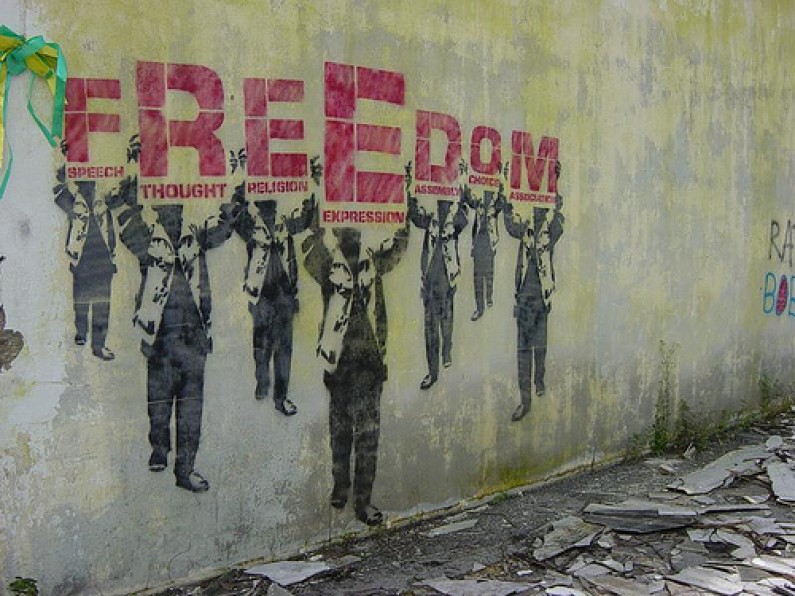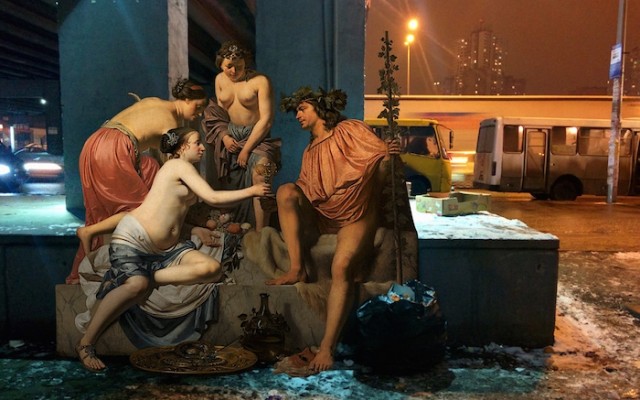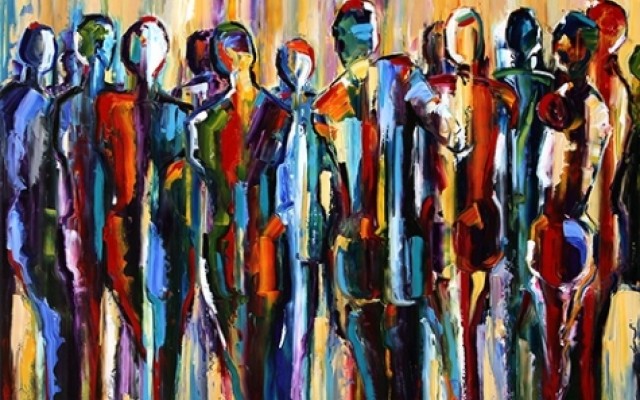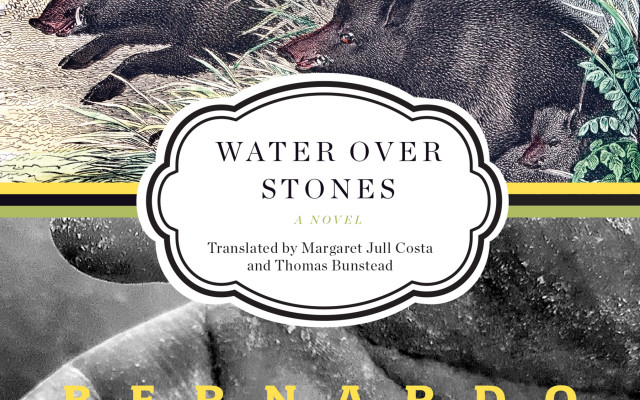Translation as Bridge to the Other: Trump’s Promise to the LGBTQ Community

“The past is never the past. It is always present. And you better reckon with it in your life and in your daily experience, or it will get you. It will get you really bad.” —Bruce Springsteen
Translation bridges the divide between languages, literatures, cultures and ideas. It can lead to appreciation of great literature; open readers to new points of view; and create better understanding of other countries, cultures, religions and socio-political issues. While publishing houses, journals, magazines and self-publishing platforms may provide the delivery mode and capital to support this bridge, its structural integrity and aesthetic value emanate from the original literary work and its translation. When left to his or her own devices, a translator can choose who and what to translate. For me the three essential criteria are passion, responsibility and artistry. When a work, anthology, story or poem contains these three elements, I am all the more eager to take on the challenge of building a literary bridge that will produce an experience for the English-language readers that parallels that of persons reading the work in its original language.
This essay will address the criteria for selecting works for translation into English; how reader perceptions of the work and its translation can change according to evolving societal and political attitudes; and how new poetry of confrontational truth presents challenges in translation and rigorous demands on the breadth of the English lexicon. The first of two poems, published in 2002, will be explored as it might be interpreted in 2002, 2013 and today. Along the way, appropriate cultural, social and political observations will inform the discussion of the translation of the second poem, written in June 2016, shortly after the massacre of 49 individuals in the Pulse nightclub. The enduring question is whether the current lack of interest in “the other” (things, ideas, gender and sexual identities, beliefs, customs, countries, religions and systems) will affect the bridges built by translators.
Selecting a Work for Translation: Passion, Responsibility and Artistry
The underpinnings of my ideal choice of work for translation can be encapsulated by one of the responses in an interview of Benito Pastoriza Iyodo, Spanish-language writer of poetry, fiction and essays who lives in the United States. The interview, published in fall 2016 in Coastlines magazine by the University of California, Santa Barbara (UCSB), asked the alumnus/author about the role of artists. Pastoriza Iyodo replied:
The artist [writer] should create to show the sublime, the grotesque, the real and the unreal of life, questioning everything so that later the readers or spectators can decide how all of this takes shape in their own lives. Within this context, writers play many roles. On one hand they are the chroniclers of our time. But a good writer, through responsible literature, is the conscience of the people. Then there is the question of language. A writer has an intrinsic duty to update the language, to enrich it, to change it, to help it to evolve - to adapt to new times. To create neologisms. To create new syntaxes. To bring it up-to-date with other universal languages. Also writers should be the flashing beacon of bright, red lights to warn us when we are about to fall into an abyss. And why not. At times the writer also has to denounce wrongs without falling into a literature of pamphleteering. Literature must expose racism, homophobia, inequity, discrimination, wickedness, injustice, poverty and all of the human evil that we have collectively created.
In my view, as writers carry out these roles, it is the responsibility of every translator to hold fast to a parallel course, reflecting the portrayal of content, context, syntax and neologism, linguistic growth and denunciations as per the original work. These challenges drive my choice of what to translate. In many cases works selected require an updating of the English lexicon, proposing and piloting the reincorporation of arcane, forgotten, or borrowed words, modifications of street language and neologisms as befits the situation.
With this framework in mind, I set out in 2015 to begin translating Cartas a la sombra de tu piel = Letters to the Shadow of your Skin by Benito Pastoriza Iyodo. The book, written in the late 90s through the start of the new millennium, was published in 2002. As the author sets out in the UCSB interview:
In this book I set out to narrate a love story between two men who battle all those opposed to their love. They fight so that their relationship will grow and become fruitful. ... The final section is the defense of this love, to integrate it into a society that continually rejects them. Many writers have produced literature with a homoerotic focus, but I am more interested in working with the homoaffective aspect of love. At the same time I was attracted to the idea of elaborating a certain poetic activism in favor of gay rights. I wanted to expose the universal reader to a love without sexual boundaries where love was simply love.
Seven poems from the collection were published in bilingual form by Exchanges. One poem, “Atrincherados / Entrenched” demonstrates how the gay couple had had to defend their love against the overt and covert hate coming from many quarters of society. In 2002 the prevailing attitude toward homosexuals bore out this testimony and gave each word the power, hurt, anger and degradation contained in every verse. By 2013, official polls showed a general acceptance and tolerance for the LGBTQ community and the US Supreme Court ruled in favor of same sex marriage. Young gays, millennials, and others could then read this poem as a remembrance to be archived in the annals of history. But since the 2016 presidential campaign and its aftermath, fears of returning to these days of tacitly sanctioned discrimination have reappeared, allowing the work and its translation to be even more impactful. We can see that this poem is not a simple chronicle of the past: the past is always present and the present colors the translation and the readers’ interpretation of the work.
The poem, in Spanish and English, conveys the palpable fear that the couple felt for their lives, with allusions to Lorca and Wilde, universally-known writers persecuted for their homosexuality, which directly or indirectly led to their death. While the fear of mortal attack had diminished in recent years, current events have pointed out the persistent homophobic attitude that still exists across broad swaths of our nation. Below is the English translation of the poem, which can be read in Spanish in Exchanges.
Entrenched
Here in this trench
buried in the deepest
social hole,
we have defended our love.
here besieged by the hate
by the anger, by the homophobia
by the insults, the sarcasm
the shouts of “faggots!”
the slashed tires,
here we don’t rent to homosexuals,
he’s a good person, but he’s gay,
they are fabulous and they love each other
but they’re queers,
here we have defended our love
in this trench for 18 years,
18 years loving each other purely
because we love each other,
not because it is approved by society,
the church, the school, the family,
the social order.
Entrenched because we have seen
brothers murdered
because Lorca was murdered
because Wilde was murdered,
and perhaps we will also be
murdered
because this book of love
that I write for you
may be the sentence
of death for our bodies,
but we continue entrenched
entrenched
entrenched until death
because this act of love
is much bigger
than our destiny
It is very likely that readers’ interpretation of this poem and the depth of meaning it holds for them has evolved, from chronicle of a reality in the recent past to a clarion call announcing a continuing and present danger being aggressively promoted. Benito Pastoriza Iyodo’s new poem titled “12 de junio / 12th of June” uses the massacre at the Pulse nightclub in Orlando, Florida as the point of departure to detail the anger, emotion and real challenges facing the LGBTQ community. And it all starts with Donald J. Trump’s promise to that community.
Background: Donald J. Trump’s Promise to the LGBTQ Community
Whatever his personal ideology regarding the LGBTQ population in the United States, Donald Trump’s statements during his acceptance speech in Cleveland, Ohio do not assuage the oppressive nature of the Republican platform or the past anti-gay actions of his running mate, Michael Pence. The fact that the Republican presidential candidate stated strongly that as president he would protect America’s LGBTQ community from “the violence and oppression of a hateful foreign ideology” does not improve the current status of our community.
This limited promise of protection, with RNC delegates chanting “Help is on the way” in the background, is no protection to the LGBTQ community at all. It is an affront to them for various reasons. All Americans should be protected from terrorist attacks, foreign or domestic.
The massacre at the Pulse nightclub in Orlando, Florida was not a terrorist act to support a foreign ideology. But even if it had been, why should the community be happy or satisfied with a promise of protection from a hateful foreign ideology when the community feels the violence and oppression of a hateful domestic ideology that is only perpetuated by the official Republican platform, by existing and pending discriminatory legislation at the state and local levels and the lack of legislative will to extend to the LGBTQ community those civil rights already afforded to other minorities in our pluralistic society. With continued promises of nominating strict-constructionist judges to the U.S. Supreme Court, we cannot afford to sit on our laurels while our newly-found rights run the risk of being eroded.
I am no political pundit or policy wonk, but I know how words can be used to unify, divide, distract and seduce the public in a populist movement. A wolf in sheep’s clothing, the law and order candidate touts the massacre at the Pulse nightclub as a terrorist attack, without knowing (or ignoring) the complicated facts behind the case or the evidence being uncovered by journalistic and law enforcement investigations. These investigations show a very plausible scenario of a closeted homosexual attacking his own community out of self-loathing, envy, and anger about not being able to accept himself in the face of the dogma of his family, religion and society.
Rather than getting distracted by the details of myriad interviews and investigations, it is important to note that Omar Mateen’s actions created the perfect storm, bringing the important issues of terrorism, gun control and homophobia to the fore. The LGBTQ community cannot allow the third element of this tidal wave—the violence and oppression of hate—to be obscured by talk of protection from Islamic extremism and gun control.
Our executive, legislative and judicial leaders need to take appropriate steps to afford the LGBTQ community the same rights and protections afforded to others. We are a pluralistic society. Where the absence of protections allows discrimination, the void should be filled with new laws. Where existing or pending laws would discriminate, they should be challenged and repealed or declared unconstitutional. Where discretion allows for profiling or negative differential treatment, there needs to be a group of concerned citizens watching.
And even as LGBTQ rights are expanded, there are still those who are dismayed. They long for the good old days and may comply with the letter of the law while their hateful behavior, words and attitudes reflect their true opinions as they go through the motions. My husband, my partner of 34 years, and I got married in New York City in 2013. Some friends and even members of our families asked us why we had to get married and why we could not just stay as domestic partners. They saw the legal advantages, but could not get over the fact of us being married. Ever since, the change in their attitudes toward us has affected the frequency and quality of our interactions with them.
The LGBTQ community is often perceived as a hedonistic, homoerotic party community, but it is important to understand that while we are not a carbon copy of the heterosexual community, we deal with similar challenges, aspire to having loving relationships, successful careers and fruitful social and cultural interactions. We celebrate the joy of family and community. For me, the world needs to know more about the homo-affective relationships that are cultivated within the LGBTQ community in spite of the judgments made by others: how we have been brave in keeping love alive and thriving in our communities. The LGBTQ community does not need a savior or a hero. We do not need a father figure to rescue us. We do not need a paternalistic political party to come to our defense. We have a well-documented tradition of defending ourselves, of fighting for our rights. And we unite, across party lines, to stand up for our own rights to fully engage in the civil, legal and social fabric of American life, free to love and be loved like all citizens of this great nation.
Benito Pastoriza Iyodo has written works that reflect this reality and fear. For “12 de junio” he used the massacre at the Pulse nightclub as a window on the continuing challenge of combatting the hatred faced by the LGBTQ community. These ongoing fears are augmented by what may come out of the 2016 presidential election, the potential change in: the makeup of the U.S. Supreme Court, official governmental policies and reprisals that may be forthcoming from emboldened homophobic groups. Pastoriza Iyodo presents the poem as a dirge as the mothers of the fallen watch and wait, recognizing the rampant hatred that led up to the tragedy. Here, the translation challenge is to create the same hypnotic tempo for the reader while searching for pejoratives in English that parallel the hateful, angry, despising slang of the Spanish original. Trying to capture the compassion of the broken-hearted, grieving mothers and the murderous hatred of others is difficult. The author denounces the homophobia, inequity, discrimination, wickedness and injustice in the treatment of the gay community. This is not the struggle of a gay couple in defense of their love. This is a call to arms to preserve the other, the one who is different in world view, culture, gender identity or sexual orientation. (The poem is presented in Spanish and English at the end of this essay.)
Translation is truly the bridge between peoples, languages, literature, and ways of thinking. Walls separate, bridges allow for sharing, learning and growth. Civilization and culture are built upon the word. We must make sure that as we move into what may be an era of impending isolationism, rejection and fear that translators will continue to construct bridges to the other.
12 de junio
los brazos caídos de las madres
los brazos vacíos de las madres
tantos cuerpos sin vida en la morgue
tantos celulares sonando en la frialdad
de la morgue
tantos nombres sin nombrar
de hermanos hermanas amigos
primos esposas esposos y amantes
que en el desapego de aquella
primera ingrata noche desgraciada
yacían solos solísimos sobre planchas
estériles heladas
cuatro a cuatro los camiones blancos
se llevaban los cadáveres
cuatro a cuatro los hombres
depositaban los cuerpos sobre las mesas
que con etiquetas inmutables
anunciaban su anonimato
y afuera
en la oscuridad de la noche
en la penumbra de la noche
en la desesperación de la noche
las madres aguardaban
las madres esperaban
las madres perdidas en la locura
las madres ahogadas en los sollozos
esperaban aguardaban
con los brazos caídos
con los brazos vacíos
en el desconsuelo
en la impotencia
porque sabían porque presentían
que sus hijos sus hijas
ahora estaban solos
impotentemente solos
abrigados tan solo
por la muerte
el odio
el terrible y asesino odio
que sus hijos habían
escuchado en la iglesia
en la mezquita en la sinagoga
el maldito odio que les tenían
por ser gais por no conformarse
a las normas establecidas por los siglos
ahora se había vuelto monarca
emperador odio de odios
el endemoniado odio
que salía de las bocas
de los que supuestamente los querían
padres tíos hombres machos machotes
amenazándoles gritándoles exigiéndoles
no seas marica no seas maricón coño
no seas joto no seas pato
no seas puto plumífero pájaro
mira que te parto el vivir
que te mato ahora mismo
que prefiero verte muerto
que de maricón
y las hermanas de la morgue
sufrieron también el vituperio
maldita no seas bollera
no seas cachapera camionera
macha machona marimacha
panadera tortillera
prefiero verte de puta que de pata
ojalá que te violen en el callejón
para que se te quite lo de macha
por qué no te moriste en el útero
de tu madre condenada
el odio perverso
el odio que te entierra vivo
odio perpetuado por la sociedad
por los gobiernos por las instituciones
aquí no se alquila a homosexuales
y menos a las lesbianas cachaperas
aquí no se emplea a homosexuales
y los transexuales que se mueran
aquí no se atiende a homosexuales
y los bisexuales que se achicharren
en las pailas de los infiernos
te voy a hacer la vida un imposible
maricón de mierda joto de mierda
cómo te atreves a pensarte igual a mí
te mato te asesino te elimino te extermino
por eso las madres
las dolorosas
las abatidas
las desgarradas en dolor
vienen con los brazos caídos
vienen con los brazos vacíos
porque en la morgue
está el anonimato está el olvido
está el resultado vergonzoso del odio
allí yacen sus hijos sus hijas
que una y mil veces fueron
pisoteados burlados violados
y finalmente asesinados
destruidos para siempre
por ese odio
por el maldito y perverso odio
que solo se alimenta de la sangre
de los inocentes de la tierra
12th of June
the limp arms of the mothers (crestfallen, drooping)
the empty arms of the mothers
so many lifeless bodies in the morgue
so many cell phones ringing in the iciness
of the morgue
so many names unnamed
of brothers sisters friends
cousins wives husbands lovers
who in the indifference of that
first ungrateful disgraceful night
lie alone very alone on sterile
frozen slabs
four by four the white trucks
carried the cadavers off
four by four the men
deposited the bodies on the tables
with immutable tags that
announced their anonymity
and outside
in the darkness of the night
in the penumbra of the night
in the desperation of the night
the mothers kept watch
the mothers waited
the mothers lost in the madness
the mothers drowned in their sobbing
waited kept watch
with their limp arms
with their empty arms
in their distress
in their impotence
because they knew because they sensed
that their sons their daughters
were alone now
powerlessly alone
cloaked only
by death
the hate
the terrible and murderous hate
that their children had
heard in the church
in the mosque in the synagogue
the accursed hate others had for them
for being gay for not conforming
to the norms established through the centuries
had once again become the monarch
emperor hate of hates
the fiendish hate
that issued from the mouths
of those who supposedly loved them
fathers uncles men machos very machos
threatening them screaming at them demanding of them
don’t be a nellie don’t be a faggot damn it
don’t be a queer don’t be a bugger
don’t be a fruit a homo a cocksucker
look I’ll kick the life outta you
I’ll kill you right now
I prefer seeing you dead
than as a faggot
and the sisters in the morgue
also suffered condemnation
damn you don’t be a dyke
don’t be a lesbo a trucker
a butch diesel dyke bull dagger
kiki lezzie
I prefer to see you as a prostitute than a queer
If only they would rape you in an alley
to get you over being so butch
damn you why didn’t you die
in your mother’s uterus
the perverse hate
the hate that buries you alive
hate perpetuated by society
by governments by institutions
here we don’t rent to homosexuals
and even less to butch lesbians
here we don’t hire homosexuals
and the transsexuals should just all die
here we don’t serve homosexuals
and the bisexuals can burn to a crisp
in the fires of hell
I’m going to make your life impossible
you shitty faggot you filthy queer
how dare you think yourself my equal
I’ll kill you murder you eliminate you exterminate you
for this the mothers
our ladies of sorrow
dispirited
racked with pain
come with their limp arms
come with their empty arms
because in the morgue
dwells the anonymity the oblivion
the shameful result of hate
there lie their sons their daughters
that a thousand and one times were
trampled mocked raped
and finally murdered
destroyed forever
by that hate
by the damned and perverse hate
that only feeds on the blood
of the innocents of the earth



